Costly treatment
 |
|
Dai Ziyi, 2, undergoes a course chemotherapy to treat mixed-lineage leukemia. Gao Bo / for China Daily |
Doctors in the hospital in Hefei told Zhang and her husband that treating Dai's illness could cost them a lot of money, and the most effective treatment would be a bone marrow transplant. However, that's likely to cost hundreds of thousands of yuan, partly because of a dearth of bone marrow sources.
They can't afford the treatment, but while they are still able to borrow money from relatives, Zhang and her husband refuse to give up.
By December, Dai had already undergone eight courses of chemotherapy, combined with medication to alleviate the lack of fresh bone marrow.
A single week long course of chemotherapy costs 5,000 to 6,000 yuan, but the overall cost can soar because the immune system becomes weaker after treatment, leading to a higher incidence of infection.
Many of the drugs used to combat infections are imported and there-fore not covered by the rural residents' medical insurance. The costs can be crippling: For example, each tablet of the most-commonly used drug, an imported anti-fungal treatment called Voriconazole, made by the US company Pfizer, costs 400 yuan. Patients are advised to take two tablets a day.
Dai has had several bouts of infection, and Zhang said he still has an infected lesion in one of his lungs.
In September, Li Shuyi contracted blood poisoning from a decaying tooth. The treatment cost his family nearly 120,000 yuan, according to his mother, ZhangMin.
As migrant workers in Bengbu, a city in the north of the province, the 36-year-old and her husband work long hours and their ignorance of the system resulted in a failure to buy medical insurance for the family. That means they have to shoulder the burden of payment themselves. So far, the couple has spent more than 200,000 yuan on their son's treatment.
"Most of the money has been borrowed from relatives and friends, but it seems it's never enough. Now our relatives and friends don't answer our phone calls, because they are unable to lend us any more," ZhangMin said.
Although some relatives have given money with no expectation of repayment, Zhang Min said she would try to repay them when Li Shiyu has recovered.
Although the government-backed medical insurance reimburses 40 to 60 percent of the outlay, depending on which county the patients come from, medicines that fall outside the approved list, such as most of those used to treat infection, are not covered. That means the parents have to foot the bill themselves.
